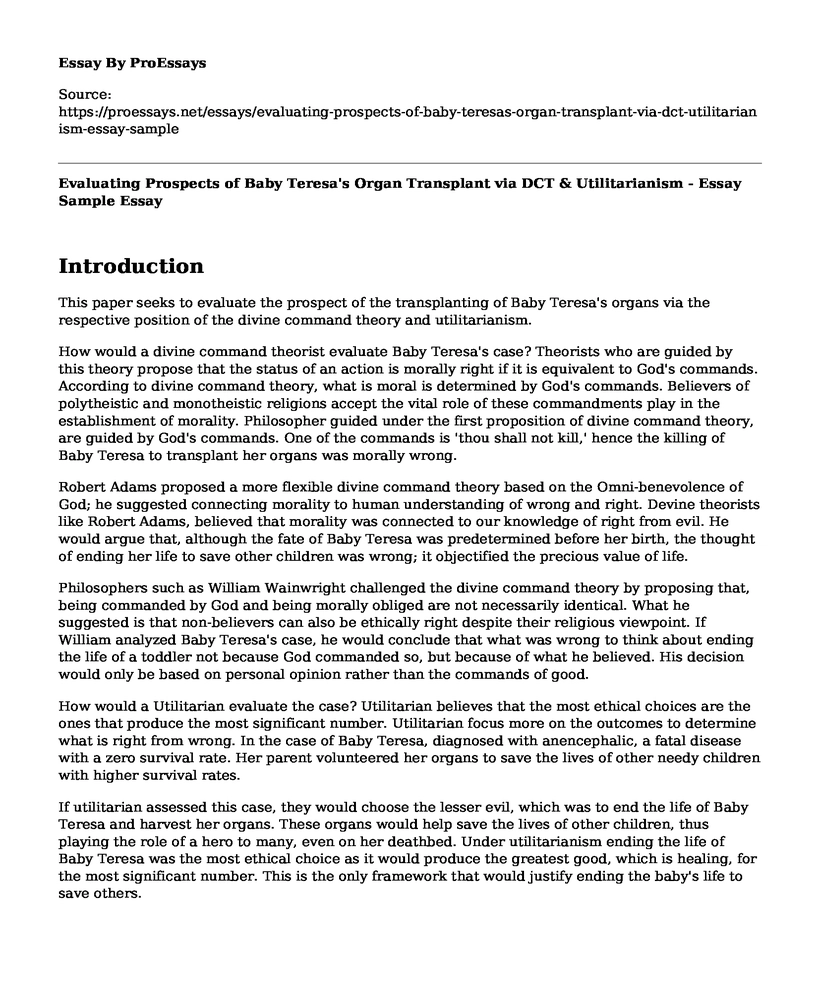Introduction
This paper seeks to evaluate the prospect of the transplanting of Baby Teresa's organs via the respective position of the divine command theory and utilitarianism.
How would a divine command theorist evaluate Baby Teresa's case? Theorists who are guided by this theory propose that the status of an action is morally right if it is equivalent to God's commands. According to divine command theory, what is moral is determined by God's commands. Believers of polytheistic and monotheistic religions accept the vital role of these commandments play in the establishment of morality. Philosopher guided under the first proposition of divine command theory, are guided by God's commands. One of the commands is 'thou shall not kill,' hence the killing of Baby Teresa to transplant her organs was morally wrong.
Robert Adams proposed a more flexible divine command theory based on the Omni-benevolence of God; he suggested connecting morality to human understanding of wrong and right. Devine theorists like Robert Adams, believed that morality was connected to our knowledge of right from evil. He would argue that, although the fate of Baby Teresa was predetermined before her birth, the thought of ending her life to save other children was wrong; it objectified the precious value of life.
Philosophers such as William Wainwright challenged the divine command theory by proposing that, being commanded by God and being morally obliged are not necessarily identical. What he suggested is that non-believers can also be ethically right despite their religious viewpoint. If William analyzed Baby Teresa's case, he would conclude that what was wrong to think about ending the life of a toddler not because God commanded so, but because of what he believed. His decision would only be based on personal opinion rather than the commands of good.
How would a Utilitarian evaluate the case? Utilitarian believes that the most ethical choices are the ones that produce the most significant number. Utilitarian focus more on the outcomes to determine what is right from wrong. In the case of Baby Teresa, diagnosed with anencephalic, a fatal disease with a zero survival rate. Her parent volunteered her organs to save the lives of other needy children with higher survival rates.
If utilitarian assessed this case, they would choose the lesser evil, which was to end the life of Baby Teresa and harvest her organs. These organs would help save the lives of other children, thus playing the role of a hero to many, even on her deathbed. Under utilitarianism ending the life of Baby Teresa was the most ethical choice as it would produce the greatest good, which is healing, for the most significant number. This is the only framework that would justify ending the baby's life to save others.
Potential Flaws in These Approaches
Devine command theory is based on God's commandments to determine what is morally right and wrong. Therefore, if this is true, then acts are morally right if God wills them because they are reasonable, or ethically honorable deeds are only good because God wills them. That is, keeping Baby Teresa alive may have been morally right if God willed it, or was right only because God willed it?
Under utilitarianism, we cannot predict the future; it is difficult to know with certainty whether the consequences of our actions will be bad or good. In this case, ending the life of Baby Teresa would be based on luck, if her being the sacrificial lamb, would she save the children's lives, or would her life been ended in vain. Utilitarian lacked accountability for equality and justice, killing Baby Teresa may have been the greatest good, but it was not the possible course of action.
Cite this page
Evaluating Prospects of Baby Teresa's Organ Transplant via DCT & Utilitarianism - Essay Sample. (2023, Jun 22). Retrieved from https://proessays.net/essays/evaluating-prospects-of-baby-teresas-organ-transplant-via-dct-utilitarianism-essay-sample
If you are the original author of this essay and no longer wish to have it published on the ProEssays website, please click below to request its removal:
- Complementary and Alternative Medicine on Quality of Life of Cancer Patients - Research Paper Example
- Argumentative Essay: Utilitarianism Versus Deontology
- Essay Sample on Public Health Perspective
- Essay Sample on Work Hard, Live Hard: A Historical Reflection on Humanity's Struggle
- Essay on Addressing Social Factors Affecting Population Health: The Need for Policy Advocacy
- Essay Example on Nurses Leverage Simulation Tech to Educate Patients on Body Anatomy
- Neurological Disorders: Alzheimer, Epilepsy, Parkinson's, Brain Tumors, Stroke, Migraine +more - Essay Sample







